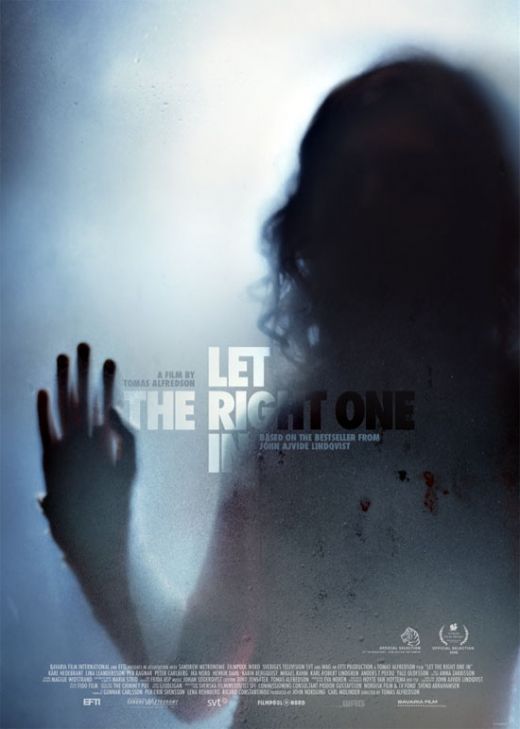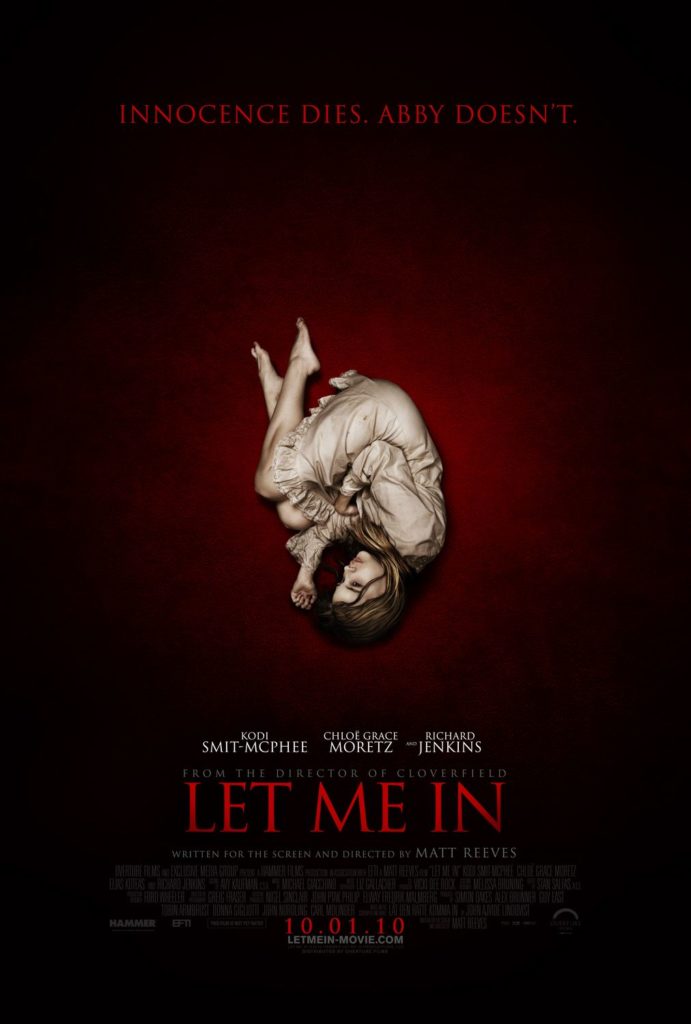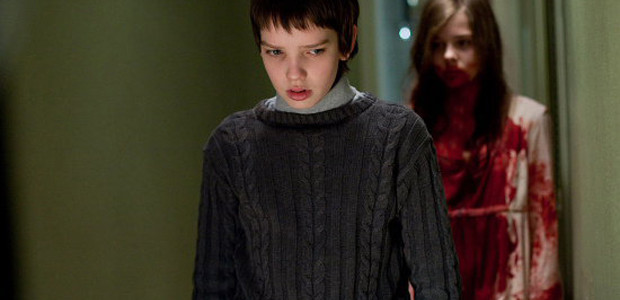Ever experienced that phenomenon where you’re discussing two things (movies, TV shows, books, etc) with someone and say, “I like them both, but I prefer A” — and their response is “why do you hate B?” as if they didn’t even hear you say you ARE, in fact, a fan of both? I wonder why that is; I’m honestly curious what it is about human beings that causes such a reaction in us and the way our fandom can make us almost blind sometimes. You can love one thing more than another without it meaning that you hate the other.
This may all seem pretty self-evident but I felt it necessary to spell out because of what I’m about to share with you: I think both the original 2008 Swedish film LET THE RIGHT ONE IN and its 2010 American remake LET ME IN are both amazing films that, if asked, I would say are 5 out of 5 stars with absolutely no hesitation.
And I’d follow that by saying “I prefer LET ME IN, however.”
I know. This is akin to a sort of blasphemy to most if not all horror fans out there. But I will repeat — AGAIN — something I stated just a few sentences ago. I think LET THE RIGHT ONE IN is an absolutely stellar movie and I don’t believe any human being with eyes and a functioning brain could deny this as a fact. I’m a huge fan of what director Tomas Alfredson & scriptwriter John Ajvide Lindqvist (adapting his own novel) achieved with the flick. The two leads, child actors Lina Leandersson (as Eli) and Kare Hedebrant (as Oskar) are just superb in their roles. It’s written beautifully by Lindqvist, directed with style and grace by Alfredson, skillfully evokes a chilly European atmosphere, is a remarkably unique spin on the vampire genre, and is just a Great Film overall (not just a Great Horror Film, to be specific).

So why do I love LET ME IN more? Is it that I’m just an ugly American who can only truly appreciate stories set in my own country? I don’t believe that to be the case at all, no — I’ve loved and admired many a foreign film since my teens, and have no fear of subtitles. I enjoy learning about other cultures and seeing how people in other countries go about their lives; it’s educational to me when I realize that for all our differences, humans have much more in common than we don’t. Foreign stories help me to remember that. So I’m gonna say that isn’t it.
Then what is it that makes the remake resonate more deeply with me? I’ll have to discuss what writer/director Matt Reeves does with LET ME IN in a bit more detail if I want to get close to answering that question, so bear with me.

Owen (Kodi Smit-McPhee) is, like Oskar in the original film, a lonely and awkward little boy. He seems like a smart kid, one who’s become used to keeping both his own counsel as well as creating his own little world where he can feel safe. His bubble protects him from the pain of his parents’ divorce (and their subsequent disappearance for all intents and purposes from his emotional life — he lives with a mom who may be “present” but sure isn’t there) AND the horrific bullying he suffers at school daily. He loves Now & Laters candy and using his telescope to insert himself into the other, more-interesting-on-the-surface lives of the neighbors in his apartment complex. The giant surface of the moon poster that takes up an entire wall in his bedroom (a detail unique to the remake) speaks to both his isolation in snowy 1983 Los Alamos, New Mexico as well as his desire to escape. To be somewhere else, even if it’s on the dark side of the moon, because it HAS to be better than where he is.
This changes one night when two new neighbors arrive. As Owen watches Abby (Chloë Grace Moretz) & an older man who appears to be her father (Richard Jenkins) enter the courtyard below his window, he’s immediately intrigued.
As we all know, Abby and Owen circle each other slowly before becoming friends of a sort, something Owen desperately craves… but she’s got a secret. Again — we all know that she’s a vampire, but what will Owen do when he discovers this? Is he in danger, physical or otherwise? We already know he’s under threat from outside forces (in literally the first scene depicting his typical school day, the poor kid is being abused by his No. 1 tormentor Kenny, played with a chilling believability by Dylan Minnette) but is Owen so thirsty for human contact and friendship that he’ll walk obliviously into a danger wherein HE satisfies the actual thirst of a monster?
For her part, Abby seems to recognize who Owen is and what he’s going through immediately. She sees him lashing out privately, mostly harmlessly and (more importantly) powerlessly. That he’s not just lonely but slowly being crushed by everything around him — the kid may not be dying but what he’s doing could never be described as “living.” The way they gradually become close is treated with a sort of quiet understatement that is as beautiful as it is bittersweet; there’s a real melancholy that hangs over these scenes because while we’ve already come to like and root for Owen, and as such we’re happy to see him make a connection, we know that the road he’s on won’t necessarily end triumphantly. Abby, who has been around the block only a few thousand times or so, is wary of Owen initially — somewhat standoffish — and almost scared of him. To Reeves’ credit this is not treated as ironic or darkly funny (even if it is to a degree), but as character. It makes Abby into a REAL being, and indicative of his refusal to take the story/character work from the original and turn it into something that betrays the truth of the piece.
That’s something that stands out with this remake: Matt Reeves clearly has a strong love and reverence for the source material that one would think would be a prerequisite for people retelling stories previously told even though we all have the experience that proves this is NOT the case. This desire to tell this story faithfully shines through in every shot of the film and every word of dialogue spoken by every actor onscreen, regardless of if it’s a direct lift from the original or not (see: the entire existence of Elias Koteas’ cop character, who doesn’t exist in Lindqvist’s novel or screenplay). Reeves is on a mission to capture the SPIRIT of what Alfredson achieved with his film, and he is as successful as one could have been, I feel.
The way that in only 40 minutes of screen time, these two damaged and imperfect characters come to reach a closeness and friendship is indicative of where Reeves’ heart truly is, and speaks to what appealed to him personally in the material. As he states in the making-of-documentary included on the Blu-ray/DVD release, he sees Lindqvist’s story as a metaphor for the pain of adolescence tucked inside a cracking genre tale. So that’s what he chases, and as we watch his film we see him catch it. A small detail (again, one Reeves keeps from the original) like Abby accepting the candy Owen offers, all the while knowing it will make her sick yet wanting to make him feel closer to her, which makes it worth it to her? That didn’t need to be in the film. Reeves could have cut that for something BIGGER, something LOUDER, maybe a wacky chase scene or gore gag in its place. The fact that he didn’t proves him to be the man for such a job, and one devoted to doing justice to Lindqvist’s very personal tale. Small moments like that abound, and some of the details that Reeves adds on top of what was already there are ones that make my heart ache. I’m thinking of the scene where Owen shows Abby a rec room where the “older kids” hang out, do drugs and have sex, but this innocent just wants to share a song with his new friend. As the song “Doot Doot” by Freur (an awesome deep cut choice, I gotta say) plays, the two of them smile shyly at each other and I find that moment to be so purely moving that I know I’ve fallen under the spell Reeves intended to enchant me with. I’m invested, and I care about these characters.
Abby’s education of Owen, as he learns to stand up for himself as best he can, only cements that as the film goes on, particularly once things with his bullies escalate which require her to get more personally involved. Just as in the original, things do not end well for them — and can we take a moment to be amazed that in this day and age, both the original and the remake have the balls to depict (not entirely graphically as almost all of what we see is merely the aftermath, but still, you damn sure know what has happened) the outright SLAUGHTER of four kids? Pulling my critic’s hat firmly down upon my head, I state this: these flicks aren’t fucking around, and that’s a fact. Not just in the violent moments that illustrate Abby’s attacks (side note: I have no problem with the obvious CG used there as I feel it does a good job of making her clearly inhuman and Something Else Entirely), but also in the way that Owen’s bullies go about their perfectly awful torture of him.
Which I suppose leads me to my entire point. Almost everything I’ve talked about so far, all the reasons why LET ME IN is an excellent and effective film, could just as easily be said of the original, which does all of those things (and just as well). So why, exactly, do I prefer LET ME IN? For me, it comes down to the main character of Owen. When I was younger, I experienced bullying myself; particularly as a pre-teen, I was hesitant to stand up for myself because, to be perfectly honest, I feared confrontation. I was afraid to be hurt, and ran from it. I outgrew that (I don’t think anyone who knows me now would describe me as being “afraid of confrontation”) but remember that feeling vividly. The way my nerve endings were on fire, the feeling of adrenaline pooling in my belly as the fight-or-flight instinct overwhelmed me…and usually ended with me either fleeing or getting my ass kicked. That memory will never go away, and watching LET ME IN dramatize incidents like it, I’m thrown right back into it. There’s an edge (in both films) to the bullying where it’s brutal without being too overtly violent, as what it ultimately results in is devastating humiliation rather than physical injury. The difference is that in watching Let The Right One in, there’s a detachment to Oskar that gives me the sense that this kid is going to grow up to hurt people, perhaps even becoming something as terrible as a serial killer, maybe. I never once got that feeling as I watched Owen deal with his tribulations, and as such I related to him more. I believe my preference for the remake comes down to something as small as that, and I’d imagine most people can understand. Viewing Oskar, I wanted things to turn out okay for him, I wanted Eli to save him, but I never particularly felt as if I’d been in his situation and understood completely where he was coming from. With Owen, I did — and I believe it truly is that simple.
I find that everything the original does, the remake does just as well for me personally, but the elements that it approaches in a different manner resonate with me in a stronger fashion. I relate to it more — and again, as I don’t want to have people asking me what my goddamn problem is with LET THE RIGHT ONE IN, am I crazy? — because I feel closer to Owen than I do Oskar, and that’s why I prefer LET ME IN to the original. I would never call it the superior film of the two; I would never say it catches the ball where LET THE RIGHT ONE IN dropped it. All I can say is that it speaks to me in a clearer voice, one I hear and understand more easily. This isn’t a competition where there’s a winner and a loser because both films are winners. I would hope that even people who are (understandably) burned out by Hollywood’s recent willingness to remake everything under the sun would find it in their hearts to give LET ME IN a chance. As often as we see these movies come about due to mere commerce, here is one that exists solely because someone saw the original film and was moved enough by it to hunt down the original novel, which he ALSO fell in love with and felt compelled to make a version that reflected his culture and surroundings and hence made it more personal.
You can make the argument that the remake is completely unneccessary simply because the original is such a terrific film and I can’t exactly argue with you there, but try to say that LET ME IN is a BAD movie and we’re going to disagree. The movie makes some changes that people may not understand — why create the cop character instead of keeping the neighbor and have some of his moments remain the same? Where’s the kitties (to be honest, I do kinda miss that weird shit)? However, none of the changes fatally damage the material or detract from the story in any way, and to me that’s the important thing. It honors the original novel and film by reconfiguring it for American audiences without losing any of the pathos or terror inherent in LET THE RIGHT ONE IN, and does so with great love and honest respect as it does so. Who among us could possibly ask for more than that, especially in this day and age of crass commercialism in so much of our entertainment?
Plastered prominently across the Blu-ray/DVD case of LET ME IN is a quote from the master of horror Stephen King himself that reads: “The best American horror film in the last 20 years.” I don’t know that I myself would go that far, but I do know that it’s a movie that both frightens and moves me, one that I will revisit again and again, and one I’d have no problem calling one of the best vampire films ever made.
If you would be willing to say the same thing about the original & have thus far resisted watching the remake because you don’t see the point of it, you could do much, MUCH worse by giving it a shot. In fact, you could be pleasantly surprised…and possibly even find that it finds a deeper place in your heart just as I have.
Tags: Adaptations, Books, Chloë Grace Moretz, Dylan Minette, Elias Koteas, Horror, John Ajvide Lindqvist, Kodi Smit-McPhee, matt reeves, remakes, Richard Jenkins, Stephen King, Tomas Alfredson, vampires


No Comments